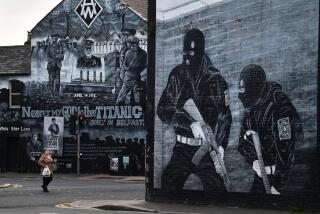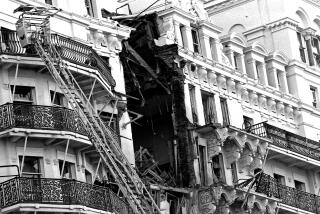Marchers Vow to Beat Blockade in N. Ireland
- Share via
PORTADOWN, Northern Ireland — Sullen but defiant, Protestant Orangemen in this town pitched tents Sunday in the damp green fields outside a Roman Catholic area they have been banned from entering, threatening to stay there by the hundreds until they are allowed to parade down Garvaghy Road.
The hard-line members of Portadown’s Orange Order brotherhood are upset that the recent peace deal for Northern Ireland might strip them of their collective cultural and religious identity. So they are insisting on completing a traditional annual parade in honor of their forebears by marching through the Catholic district--despite widespread fears that the march might lead to new violence in this British province.
But, as of late Sunday, heavy fortifications put up by the British army the day before, and a strong troop and police presence, had prevented them from entering the Catholic thoroughfare that is their usual route home after an annual service at Drumcree church on the edge of town.
The result was a stalemate.
“We will be staying as long as it takes,” Harold Gracey, grandmaster of a Portadown Orange lodge, told a crowd of cheering Orangemen in bowler hats, black suits, orange sashes and white gloves who had massed in the gray town center before the march began. He said he was against violence.
President Clinton is among the political leaders who have appealed to Protestants and Catholics alike not to let the dispute derail the fragile peace process and nudge the province back toward its 30-year past of guerrilla war.
“Up to now, it has been a very dignified march, and I just hope people will take the route back that they took to the church,” Britain’s secretary for Northern Ireland, Marjorie “Mo” Mowlam, told BBC Radio.
But there was no sign that anyone in Portadown was heeding the appeals. Instead, women from town were setting up soup kitchens in the fields, and the British Union Jack flags favored by pro-British Protestants in the province went up over the tents.
“If the Orange Order is beaten in Portadown, it is beaten everywhere. It is the very heart of the order, and republicans are trying to stop the heart beating,” said Joel Patton, leader of an extremist Orange group called the Spirit of Drumcree.
*
Between 3,000 and 8,000 marchers wound out of town Sunday morning to Drumcree church on the first leg of the march, walking in step to the beat of drums. Thousands came from elsewhere in the province to swell the ranks of Portadown’s own 1,500 Orangemen.
Suspicion of outsiders was palpable within their ranks. Tight-lipped, with hostile stares, two women explained that they would not talk to American journalists because Americans are secretly raising money for Catholic republicans.
Robert Anderson, a spokesman for the Orange Order, said he expects more Protestant supporters to travel to the area this week. He said tempers could flare and trouble begin if the standoff continues for several days.
“The whole of Northern Ireland is in the wilderness. Jesus is the only one who can help us now,” the Rev. John Pickering of Drumcree church said.
For the last three years, Northern Ireland’s overwhelmingly Protestant police have let the Orangemen traverse Garvaghy Road, forcing Catholic residents back into their homes as their set-faced Protestant neighbors, in old-fashioned uniforms, marched by to the relentless beat of drums. The results have been disastrous: unrest, rioting and disorder across the province.
But this year, with the April peace agreement to uphold, leaders in the province have gone to greater pains to soothe Catholic resentment over the Orangemen’s summer “marching season.” It is scheduled to reach its peak next week, with a march July 13 commemorating the Protestant Prince William of Orange’s victory against a Catholic king three centuries ago.
*
The route of the Portadown march was redrawn at the beginning of last week. While the 1,500 local Orangemen from this town of 30,000 people could still meet in the town center, parade out through the fields to Drumcree church and remember their dead in a special church service, they were told to come back to town this year by a less controversial route than Garvaghy Road.
When they refused, police and the British army threw up strong defenses around the Catholic district to prevent the marchers from breaking in. By Sunday, the fields were full of barbed wire and trenches. Two huge heaps of concrete blocks sealed off the road from the church to the Garvaghy area. Surveillance cameras towered over the fields, the vicinity was to be floodlighted after dark, and helicopters buzzed under leaden skies.
Two thousand troops and police were on duty in the area.
“I can see the police, the Parades Commission and the government are all one way against us, but what can our fellows do but stand up for their rights?” asked Robert Saulters, grandmaster of the Orange Order. “If they are beaten, that is one thing, but they can’t give in.”
The heavy defenses and the outward quiet of Sunday afternoon did not reassure the Catholics of Garvaghy Road. After morning Mass, the area’s streets emptied. Inside their homes, anxious residents watched the standoff at the barbed wire a few hundred yards away on their television screens.
Garvaghy Road community leader Breandan MacCionnaith told reporters that the presence of Orangemen from all over Northern Ireland was like a “loaded gun” pointed at the Catholic community.
He said he feared that the large buildup of Orange supporters might lead the police to reverse the ban on the march--imposed by the independent Parades Commission--and allow the marchers through.
“The British government must send out a clear signal that this decision will not be overturned through the use of large numbers by the Orange Order,” MacCionnaith said.
More to Read
Sign up for Essential California
The most important California stories and recommendations in your inbox every morning.
You may occasionally receive promotional content from the Los Angeles Times.










